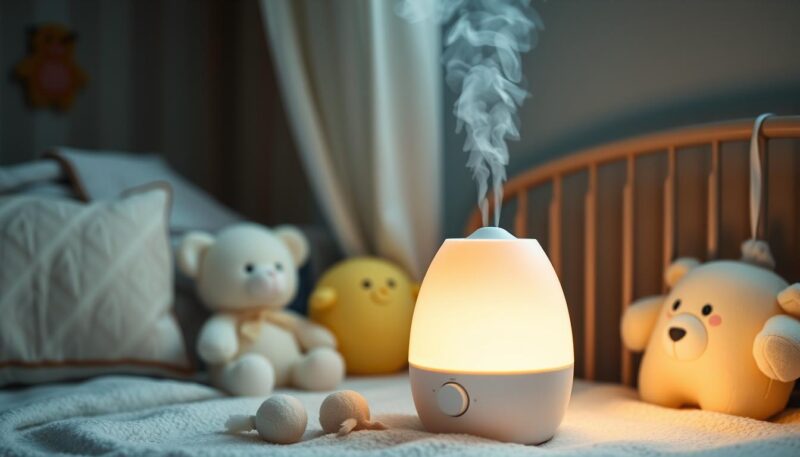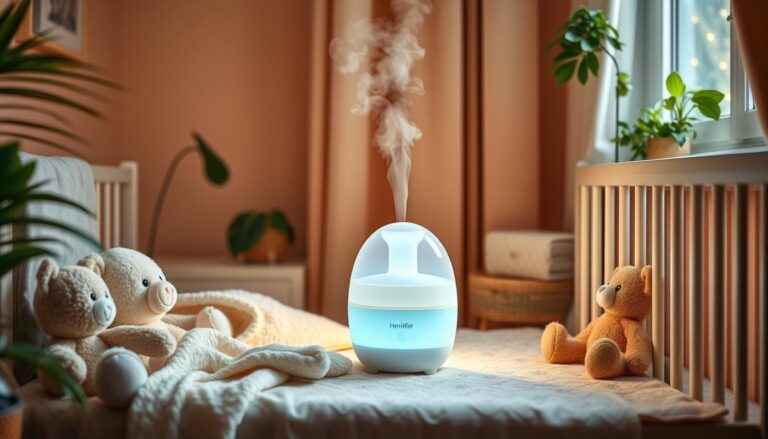As a parent, your primary focus is on providing a safe and comfortable environment for your baby. One essential element you may not have considered yet is the air quality in your baby’s nursery. When the weather shifts, often bringing colder temperatures, many families rely on heating systems that can significantly deplete moisture from the air. This dry air can lead to a myriad of complications, particularly for those with sensitive skin and developing respiratory systems. That’s where humidifiers come in, playing a crucial role in maintaining optimal moisture levels to enhance baby comfort.
The benefits of humidifiers extend far beyond simple coziness; they are vital for promoting health and well-being. Experts recommend maintaining humidity levels between 40-60% in a baby’s room to inhibit airborne pathogens effectively, thereby reducing the likelihood of colds and respiratory infections. Research shows that humidifiers can also help to combat skin problems like eczema, keeping delicate skin hydrated. As you equip your nursery, considering a humidifier among baby nursery essentials could greatly improve your little one’s health and comfort. In this article, we’ll delve into the specific benefits of using a humidifier, exploring how it can create a nurturing environment for your baby.
The Importance of Humidifiers in Your Baby’s Nursery
Creating a comfortable environment for your baby is essential for their health and well-being. One of the common challenges many parents face is dry air, particularly during colder months. Understanding the implications of dry air is key to ensuring your little one thrives.
Understanding Dry Air and Its Effects on Babies
Dry air can lead to significant discomfort for infants, making it vital to address this issue. It may contribute to skin problems, notably dryness and worsening conditions like eczema. Babies have delicate skin that requires moisture to stay healthy. In addition, dry air can exacerbate respiratory problems, often causing congestion and difficulty in breathing. This environment not only affects daily comfort but may also hinder restful sleep, resulting in moments of distress during the night.
Supporting Baby Health with Moist Air
A humidifier for baby use can transform a nursery into a haven of health. By adding moisture to the air, you can support baby health by keeping nasal passages hydrated, which is crucial during cold and flu season. This setup aids in preventing dry skin in babies while also easing congestion by loosening mucus. Pediatricians often recommend these devices, emphasizing their benefits in maintaining indoor humidity levels between 30-50%. This approach can improve breathing, alleviate symptoms associated with respiratory infections, and promote better sleep quality.
| Aspect | Recommendation |
|---|---|
| Type of Humidifier | Cool mist humidifiers preferred |
| Water Type | Use distilled water |
| Distance from Baby | At least 6 feet away |
| Humidity Levels | Maintain between 30-50% |
| Monitoring | Regularly check humidity levels |
| Cleaning Frequency | Routine cleaning needed |
Using a humidifier in your baby’s nursery not only enhances comfort but also plays a crucial role in preventing health issues associated with dry air. Incorporating these devices into your baby care advice is a proactive step towards ensuring a healthy environment for your infant.
Humidifier Benefits for Baby: Key Advantages
Humidifiers offer a range of benefits for your baby’s nursery, making them essential for optimal baby room care. Understanding these advantages can help you create a more comfortable and healthy environment for your little one. Here are some key benefits to consider:
Soothe Baby’s Skin and Prevent Dryness
One significant advantage of humidifying for baby is its ability to soothe baby’s skin and prevent dryness. Infants are particularly susceptible to skin irritations, especially in dry air conditions. Moisture from a humidifier helps keep skin hydrated, reducing the likelihood of uncomfortable conditions such as cradle cap and eczema. Regularly maintaining humidity levels between 40% and 50% plays a crucial role in ensuring the comfort of your baby.
Enhancing Sleep Quality
Using a humidifier can act as a baby sleep aid by enhancing sleep quality. Babies often face disruptions from congestion, which can hinder their ability to settle into deep sleep. The moist air not only alleviates congestion but also creates a soothing ambiance in the room. This environment is crucial during the early months of parenthood, as pediatric experts indicate that maintaining comfortable air moisture levels aids in better sleep patterns.
Reducing Airborne Pathogens
A humidifier significantly contributes to reducing airborne pathogens in your baby’s nursery. Proper humidity levels can decrease the likelihood of viruses and bacteria circulating in the air, providing vital protection for your child. By keeping the air moist, you can inhibit the growth of harmful microorganisms, thereby lowering the risk of colds or flu. Monitoring humidity levels regularly is vital to maintaining a safe atmosphere for your baby.

Conclusion
Investing in a humidifier for your baby’s nursery is an essential step in promoting a healthier environment. The benefits of humidifier use are numerous, aiding in soothing dry skin and enhancing sleep quality, while also combating airborne pathogens that can affect your little one’s health. As part of your baby care advice toolkit, a humidifier can transform the nursery into a comfortable sanctuary, especially as the air tends to dry out during colder months.
By maintaining optimal humidity levels between 30-50%, as recommended by the American Academy of Pediatrics, you can help prevent dry skin issues such as rashes and eczema. This aligns perfectly with parenting tips that prioritize your child’s comfort and well-being. Remember to choose a cool mist humidifier for safety and ease of cleaning, ensuring a peaceful atmosphere for sleep.
In conclusion, as you navigate the challenges of parenthood, consider how a humidifier can effectively support your baby’s health and happiness. Providing adequate moisture in the air not only enhances comfort but also protects your little one from the adverse effects of dry indoor conditions.

